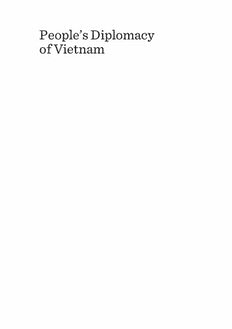
People’s Diplomacy of Vietnam: Soft Power in the Resistance War, 1965-1972 PDF
Preview People’s Diplomacy of Vietnam: Soft Power in the Resistance War, 1965-1972
People’s Diplomacy of Vietnam People’s Diplomacy of Vietnam : Soft Power in the Resistance War, 1965-1972 By Harish C. Mehta People’s Diplomacy of Vietnam: Soft Power in the Resistance War, 1965-1972 By Harish C. Mehta This book first published 2019 Cambridge Scholars Publishing Lady Stephenson Library, Newcastle upon Tyne, NE6 2PA, UK British Library Cataloguing in Publication Data A catalogue record for this book is available from the British Library Copyright © 2019 by Harish C. Mehta All rights for this book reserved. No part of this book may be reproduced, stored in a retrieval system, or transmitted, in any form or by any means, electronic, mechanical, photocopying, recording or otherwise, without the prior permission of the copyright owner. ISBN (10): 1-5275-2309-8 ISBN (13): 978-1-5275-2309-8 I dedicate this book to the memory of my parents, Kanta and Daulat Ram Mehta, who lived in, and loved, colonial and postcolonial India Map of Vietnam by the courtesy of the Perry-Castaneda Library. CONTENTS Acknowledgements .................................................................................... ix List of Abbreviations .................................................................................. xi Introduction ................................................................................................. 1 The Missing “People” in the Diplomacy of the Vietnam War Chapter One ............................................................................................... 19 The Origins of People’s Diplomacy: “Peeling the Colonial Tangerine” Chapter Two .............................................................................................. 55 Cracking the “Western Alliance”: “They are Winning the Propaganda War Against Us” Chapter Three ............................................................................................ 87 Globalizing the Resistance in “Non-Aligned” Countries: “Shipments for Solidarity” Chapter Four ............................................................................................ 119 Navigating the Sino-Soviet Split: The Diplomacy of Securing Communist Aid Chapter Five ............................................................................................ 151 Creating the War Crimes Tribunal with Bertrand Russell: “President Johnson, Please Stand Trial before Our Judges” Conclusion ............................................................................................... 199 Recognizing the Diplomatic Front in the History of the Vietnam War Bibliography ............................................................................................ 209 Index ........................................................................................................ 227 ACKNOWLEDGEMENTS I owe several debts of gratitude to persons and institutions that helped see this book through. Stephen Streeter provided valuable insights on the manuscript. David Barrett, Virginia Aksan, Andrew Johns, and James Benn, gave useful suggestions. Funds for multi-archival research in Vietnam and the United States came from a Richard Fuller Memorial Scholarship, and a Mildred Armstrong Award from McMaster University, and two Samuel Flagg Bemis research awards from the Society for Historians of American Foreign Relations. Do Kien of the Institute of Vietnamese Studies and Development Sciences in Hanoi was most helpful in obtaining permission to access the archives. Nguyen Tien Dinh, manager of access and reference at National Archives Center Number 3 in Hanoi, and the archive’s staff welcomed me. Vietnamese graduate students Nguyen Binh Minh, Vu Minh, and Vu Duong Luan helped me work through documents in Hanoi. And, Bui Thi Hue and Pham Xuan Thao helped locate documents at National Archives Center Number 2 in Ho Chi Minh City. Nguyen Huu Nguyen of the Social Sciences and Humanities Center in Ho Chi Minh City explained the Vietnamese perspective on the war. I was fortunate to have excellent Vietnamese language instructors in Nguyen Tuyet Hang, Dang Thanh Chuc, Diana Leisk, and Nguyen Thu Thuy with whom I studied in Bangkok in 2001-2002, and Kim Ha in Toronto in 2006. In Austin, Texas, John Wilson and Regina Greenwell, archivists at the Lyndon Johnson Library, and Carl Spadoni and Ken Blackwell at the Bertrand Russell Archive at McMaster University, led me to important papers. Pierre Asselin shared significant North Vietnamese communist party documents with me, and Mrinal Chandra Sen Gupta’s guidance was helpful. I also thank Vietnamese officials Nguyen Cong Quang and Do Cong Minh in Hanoi, and Nguyen Van Niem in Ho Chi Minh City for arranging meetings with Vietnamese government ministers, over the years. My wife Julie’s encouragement and criticism made this project both rewarding and challenging. I acknowledge the support of my family: my brother Vinod and his wife Sumita; my sister Anjana, and nephews Sanjay and Rajat (and their wives Ipsita and Shailaja); my brother Ashok, who inspired my interest in conflict studies; as well as my caring and supportive parents-in-law Tarun and Anima Banerjee, whose home in Calcutta was a rest and recuperation haven after the research trips to x Acknowledgements Vietnam. I thank my brother- and sister-in-law, Ranjan and Carmen Banerjee, for welcoming me into their home in idyllic Potomac Falls, Virginia, for an extended stay when I was doing research at the U.S. National Archives at College Park, Maryland. Finally, I thank my editors and designers at Cambridge Scholars: Victoria Carruthers, Matthew Scott, Rebecca Gladders, Helen Edwards, Hannah Fletcher, James Brittain, Sophie Edminson, and Courtney Blades.
